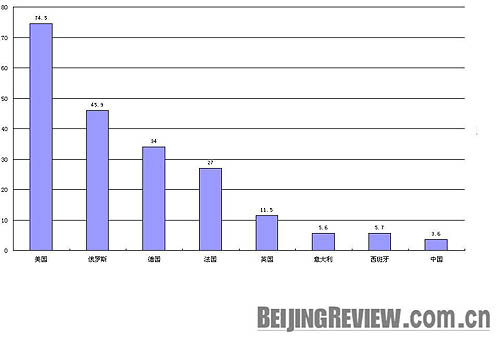|
The export buyer's credit and concessionary loans China committed mostly have been implemented. Its commitments to double its official development assistance to Africa in 2006 by 2009 and build 100 primary schools and 30 hospitals in Africa are also being put into practice.
Trade and politics
Trade and politics are not the same thing but are developing in the same direction as far as China-Africa relations are concerned, said Liu. The development of trade between China and Africa is conducive to their political relations, although trade, which goes by market rules, and politics are not directly linked to each other, he said.

China's investment in Africa's infrastructure construction, official development assistance to Africa and diversified collaboration with African countries has contributed to the sound development of China-Africa relations, he said. China is opposed to politicizing China-Sudan relations. "China's oil exploration in Sudan is normal trade," Liu said. "Attempts to politicize it are unacceptable."
Liu said some Western media and NGOs disapprove China-Africa cooperation for two main reasons. First, some European countries are concerned about the rapid expansion of China-Africa cooperation in recent years without a clear understanding of China's purposes. Believing that there is a lack of transparency, they demand that China provide more information, a demand that Liu said was understandable. Second, some media organizations and NGOs are not psychologically prepared for China's entry into Africa. Since Europe has historical linkages with Africa, they believe China has jeopardized the interests of some European companies as it increases its economic presence there, Liu said.
The cooperation between China and Africa is equal and mutually beneficial, Liu said. It is not targeted at European companies in terms of policymaking and project choosing. The cooperation is not exclusive to European companies, either. In fact, European companies, with their deep-seated influence in Africa, tend to keep Chinese companies out of the African market. Despite this unfair treatment, many Chinese companies have gained their share of the market with their high project quality, competitive prices and efficiency, Liu said.
China's entry into the African market is not meant to undercut Europe, he added. The Chinese Government takes a positive and open attitude toward cooperating with European countries on African affairs. Given their different visions, they practice different policies on Africa. It therefore takes time to make substantial progress in their cooperation. China does not want to see itself confronted with Western countries in Africa. Instead, it is eager to work together with them in the spirit of equality and with a respect for Africa, he said.
Positive future
Trade between China and Africa has soared in recent years. Two-way trade volume was $10.6 billion in 2000. It jumped to $73.57 billion in 2007, an increase of 32.7 percent over the previous year, according to the statistics of China Customs.
China's investment in Africa also has increased rapidly. While standing at some $1 billion for years, it climbed to $10 billion in 2007. Infrastructure construction is a major area of Chinese investment. Notably, China has invested in many projects that some Western countries are unwilling to undertake. An increasing number of people have come to recognize China's efforts to build ports, bridges, highways and railways in Africa, which have laid a solid groundwork for Africa's social and economic development.
Robert Zoellick, President of the World Bank, has said on different occasions that China's investment in Africa's infrastructure is good for Africa and should not be criticized. The World Bank is willing to take China as a partner in a joint effort to alleviate poverty in Africa, he added.
Senegalese President Abdoulaye Wade commented on China-Africa relations in an article in Financial Times in January. "If Europe does not want to provide funding for African infrastructure," he wrote, "the Chinese are ready to take up the task, more rapidly and at less cost. Not just Africa but the West itself has much to learn from China."
Defects remain in China-Africa trade structure. China mainly imports raw materials and energy from Africa, while manufactured goods represent only a small fraction of their trade mix. But this practice is not unique to China. Western countries also follow this pattern while trading with Africa. In fact, the trade structure is closely associated with Africa's economic structure. In order to reverse this situation, the Chinese Government encourages Chinese companies to import more manufactured goods from Africa. It also seeks to add value to African raw materials by helping African countries to develop processing industries.
| 